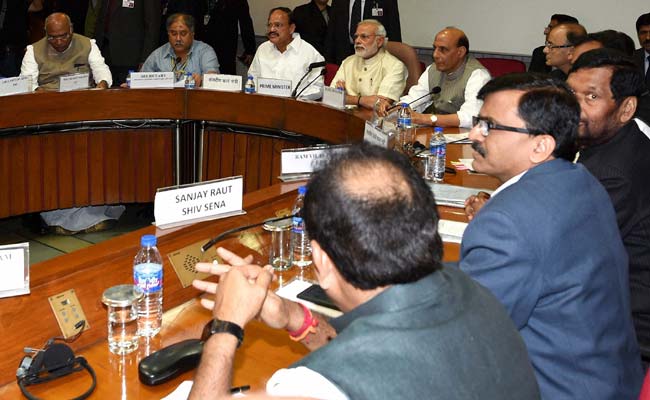New Delhi: Prime Minister Narendra Modi today said that it was the -collective responsibility of all parties- to ensure the smooth functioning of the Parliament ahead of the Budget session on Monday. The government is looking to pass key legislation, including bills to replace a slew of ordinances, in this session that is expected to be a stormy affair.
Here are the latest developments:
At a meeting of leaders of all parties in both Houses of Parliament hosted by Parliamentary Affairs Minister Venkaiah Naidu, PM Modi said, “Country looks at Budget session with hopes and aspirations, it is the collective responsibility of all parties to ensure it runs smoothly.”
His government is set to present its first full-fledged budget on February 28 in the session that will conclude on May 8.
In the evening, Lok Sabha Speaker Sumitra Mahajan has convened an all-party meeting which PM Modi is likely to attend.
Earlier in the day, Mr Naidu met Congress President Sonia Gandhi and described the meeting as “cordial”. The government would need the help of Congress, especially in the Rajya Sabha where it is short on numbers, to help push through legislation seen as crucial to PM Modi’s reform agenda.
Important among these are ordinances on raising the foreign investment limit in insurance, auctioning coal mines and changing the rules of land acquisition, the latter having generated much protests from the Opposition as well as farmers’ organisations.
“We are aware that land acquisition is an emotive issue as it concerns farmers. We need to address this issue sincerely without undue politicisation,” Mr Naidu said today ahead of a two-day agitation by Gandhian activist Anna Hazare in the national capital on Monday against the ordinance.
Concerned about being viewed as anti-farmer, senior leaders of the BJP met last evening to explore the possibility of modifications to the land ordinance, sources told NDTV.
“We won’t support any ordinance which is anti-people… the government should not expect us to support them,” senior party leader Ghulam Nabi Azad said.
The ordinances have to be ratified by Parliament within six months, or it expires.
In its seven months in office, the government has used the ordinance, or emergency executive order, 10 times due to its lack of majority in the upper house of Parliament or Rajya Sabha, where the opposition Congress has most numbers and has led other parties in holding up proceedings on a number of issues, not allowing legislation to be passed.


